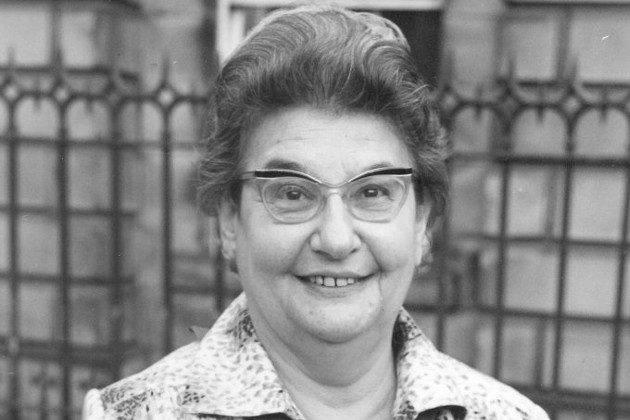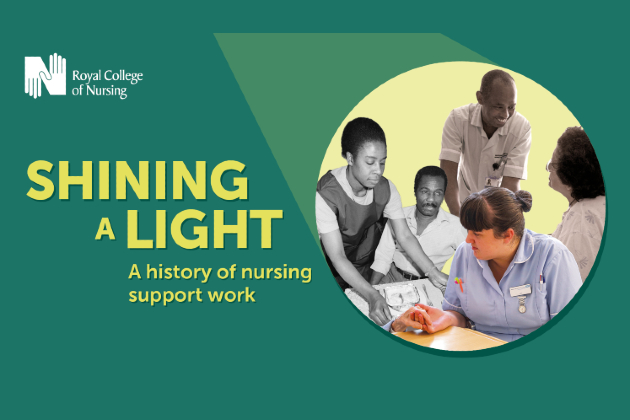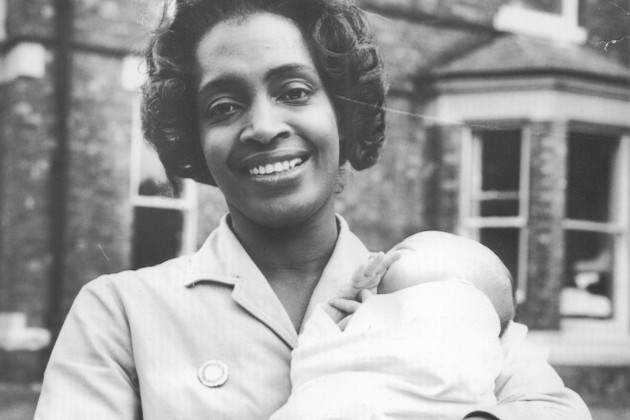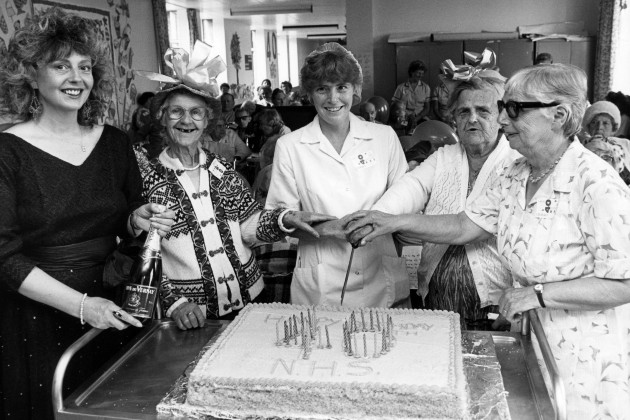As part of my research into Jewish refugees from Nazi-occupied Europe who came to nurse in the UK, I visited the archives of the RCN in Edinburgh. I did this ahead of the 75th anniversary of the NHS and found many stories linking the two.
From the early years, our NHS hospitals and community settings employed and trained people who migrated to the UK as nurses. We know a little about the many Irish people who came over to nurse and the Windrush nurses are rightly commemorated. However, until recently, one group of nursing migrants – in this instance, refugees – has been largely forgotten.
Many Jewish refugees fled Nazi-occupied Europe in the 1930s and entered the nursing profession in the UK. In 1940, the Home Office noted 941 refugee nurses, probationer nurses (students), and midwives. As employment opportunities for Jewish refugees widened during the war years, more joined the profession. While we will probably never know the exact figure, it’s thought that by the end of the war there were about 3,000 Jewish refugees who were nurses or midwives.
Escaping Germany
Adolf Hitler came to power in January 1933, and within 2 years his anti-Semitic regime forced Jewish people in Germany out of work and school and into ghettos and camps.
On 9 November 1938 a violent riot, historically known as Kristallnacht, was unleashed on Jewish people living in Germany and Austria. At this point many families realised that Hitler meant to harm all Jews and the only sure way to save themselves was to flee.

It was this experience that compelled Elizabeth Katz, who had been a student nurse at the Jewish Hospital in Frankfurt, to leave for England: “I just applied […] and I was lucky,” she said. “England wanted student nurses.”
Nursing as an opportunity
By the 1930s, advances in medicine were placing a greater burden on hospitals, which required increasing numbers of skilled nursing staff. However, frustrating restrictions, long hours and poor pay meant that many of the nation’s young women did not wish to be nurses.
Even when hospitals could recruit, retention was poor. In 1938, the Association of Nurses reported that 38% of probationer nurses left in the first year and only 50% ever qualified.
In response to the impending crisis, the RCN encouraged the recruitment of Jewish refugees. This was due to growing sympathy towards their circumstances, but there was also increasing concern about severe nursing shortages as the country moved closer to war.I enjoyed the friendship which a lot of the nurses showed me
Margaret Hodge had been a student nurse at the Jewish Hospital in Berlin and was offered a nursing visa and a position at St James’ Hospital in Leeds. She commented that she: “adapted well to the life and work in a large English hospital. I enjoyed the friendship and comradeship which a lot of the nurses showed me.”
The realities of war
As the war years dragged on, more and more British nurses volunteered for active service overseas, leaving the nation’s hospitals depleted. The government redoubled its effort to encourage Jewish refugees into the profession.
On 1 January 1942, Trudie Moos started her nurse training at the Royal Free Hospital in London. Moos accepted that the work was hard, though interesting: “We had to bathe them in bed, make their beds at least twice a day, lift the patients, feed the helpless ones, clean their mouths and attend to their pressure areas. The bed baths gave us a splendid opportunity to listen to the patients’ worries.”
Like Moos, other refugee nurses worked alongside their British counterparts, helping the population of Britain manage wartime illness and injury.
From my research, I discovered that Hortense Gordon started at St Mary’s Children’s Hospital in Carshalton in 1941. In 1943 Lee Fischer commenced her training at Booth Hall Hospital in Manchester, and Cilly Haar began working at Lambeth Hospital.
I was still suffering from the trauma of losing my parents
I found a high number of nurses who came to the UK as Jewish refugees but as the war progressed, reports of their families’ deportations and deaths infiltrated their lives in a devastating way.
In her memoir, Haar recalled: “I knew that I would never hear from my family again, but I always, even now, have hope that my sister is alive somewhere, though extensive searching has proved negative.”
Gertrude Roberts noted: “I remember very little about VE (Victory in Europe) Day, it didn’t seem to matter to me very much. I was still suffering from the trauma of losing my parents.”
The bed baths gave us a splendid opportunity to listen to the patients’ worries
The National Health Service
The number of nurses across the UK fell in the years between the end of the second world war and the founding of the NHS.
In March 1945, there were approximately 11,000 nursing vacancies across the country. In 1948, that number had risen to between 40,000 – 50,000.
Refugee nurses couldn’t save their families, but they could help those in the UK whose lives had been fractured by war and continued to be a struggle with rationing, bombed homes and a population who had never received proper health care.
In 1947, refugee nurse Annie Altschul, who would later become the first professor of mental health nursing in the UK, listened to the debates about the new health service. She was concerned that the system would be organised around medical schools.
Additionally, the establishment of the NHS was predominantly led by male doctors, politicians, intellectuals and pressure groups. Each of these groups had specific power dynamics which they wanted to maintain.
Women’s voices
We know from the work of medical historians that many in the medical profession were not supportive of the NHS. Furthermore, women’s voices, specifically those of nurses – who were likely to see the benefits and had less to lose financially – were not asked. Their voices are largely silent, despite making up the largest single body of workers.
Nevertheless, Altschul was not the only refugee nurse to be enthusiastic about the new service.

Moos called it a “shining example for and the envy of many countries, including the United States.” In 1954, Moos, then a sister tutor, decided to take a year off to travel and work in the US.
According to her memoir, the matron of the Royal Free Elizabeth Cockayne sent Moos off with a large document on the NHS, so she could be an ambassador for the new service. If by the 1950s the advantages of the NHS were being heralded overseas, its value to the nation was clear from the start.
‘A jubilant day’
Prior to the founding of the NHS in 1948, district nursing had been independent from the hospital service and funded through local nursing associations. Families would pay a subscription fee to be a member of an association and have access to the service, or they would be required to pay for individual visits. In her oral history, Lisbeth Hockey – later the first director of nursing research in Europe – reflected on the changes to the nation’s access to health care and therefore their own work with the coming of the NHS.
“Didn’t enjoy the pre-National Health Service days so much because you had to ask the patient for money," she said.

"You know we had a receipt book and it was half a crown a visit and so you might have to give an old lady an enema and charge her half a crown when you’ve caused her a lot of misery and embarrassment.
“So that worried me, and some patients really couldn’t afford […] I remember with great delight the 5th of July 1948, which was the day the National Health Service came into operation and that day, all our receipt books were done away with and there was no more money to be collected, and that was a very jubilant day.”
A life of independence
It’s almost impossible to summarise the lives of these courageous people who entered the nursing profession having fled their homeland. However, their contribution to the founding of the NHS was hugely important, and for the women themselves, nursing led them to a life of independence.
Most of the Jewish refugee nurses mentioned remained in the profession. Most continued to work in the NHS or remained closely related to it.
According to Stephanie Snow, the historian at the centre of NHS at 70: “The core purpose of the NHS is grounded in humanitarianism; it alleviates suffering through giving care and treatment to those in need.”
It's not surprising that refugees like Hockey, Moos and Altschul were excited by its promise. To them, the NHS represented what they didn’t have in their younger lives.
Further information
- Visit the RCN History of Nursing Forum page to find out more about their work and how to join.
- Read Jane Brooks’s blog about visiting the RCN Archive in Edinburgh.
- RCN Archive contains records relating to the work and history of the RCN, but also the rich and diverse voice of nursing through our personal collections and oral histories. Explore the RCN Archive here.








